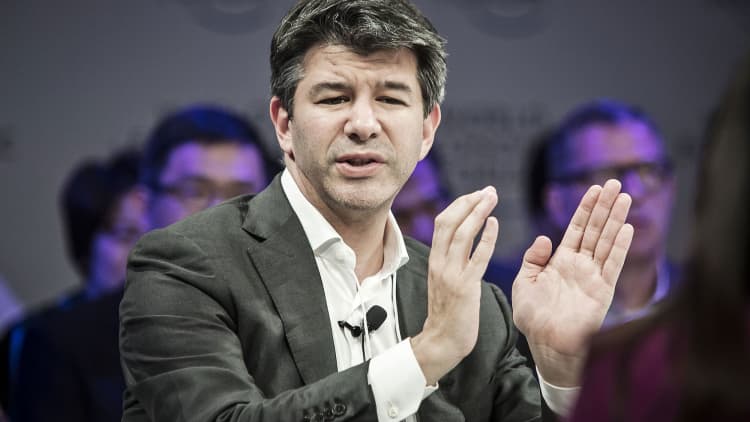The head of IBM, who also advises the president on business matters, sent a company wide memo Thursday defending her collaboration with the Trump Administration, as tech executives from Travis Kalanick to Elon Musk face intensifying pressure to challenge the White House on immigration and other issues.
"Some have suggested that we should not engage with the U.S. administration. I disagree," IBM CEO Ginni Rometty told employees last week, in a letter obtained by BuzzFeed News. "Our experience has taught us that engagement – reaching out, listening and having authentic dialogue – is the best path to good outcomes."
More from Buzzfeed:
This Mar-A-Lago Member Had A Great Time Photographing Trump Handling A National Security Crisis
North Korea Can't Launch A Nuclear Missile At The US Yet, But This Is How It's Going To Try
This Company Said Its Bot Wrote Part Of Trump's Inaugural Speech. It Didn't.
IBM declined to comment but did confirm the authenticity of the memo.
Rometty, like SpaceX and Tesla chief Elon Musk, serves as a business advisor to the president on his Strategic and Policy Forum. The group first met with Trump earlier this month, when they discussed jobs, cybersecurity, and the president's recent immigration order that barred refugees and people from seven Muslim-majority countries from entering the US.

At the White House meeting, Rometty said in the letter that she discussed "ways that advanced technology could address national security imperatives while also permitting lawful immigration and travel." She added: "I explained that this is not an either/or choice. Our points were heard, and we will continue to engage to find solutions that align with our values."
Rometty described her meeting with the president as part of a long history of non-partisan, public engagement at the company. "IBM leaders have been engaging directly with every U.S. president since Woodrow Wilson, and this was my ninth such meeting since becoming CEO," she said.
Her stance contrasts with that of Uber CEO Travis Kalanick, who was slated to attend that White House meeting but backed out just a day before after mounting criticism and a viral #DeleteUber campaign. In a letter to his employees, Kalanick announced that he would no longer be a part of the economic council. "Joining the group was not meant to be an endorsement of the President or his agenda but unfortunately it has been misinterpreted to be exactly that," he said. Musk, on the other hand, said he would stay on as an advisor to the president for "the greater good."

And while Uber, SpaceX, and Tesla were among the more than 130 tech companies that joined a friend-of-the-court brief opposing Trump's immigration order, IBM was not a signatory.
In December a spokesperson for the company told BuzzFeed News that IBM would no help build or provide data for a Muslim registry, an idea Trump proposed during the presidential campaign. "No, IBM would not work on this hypothetical project. Our company has long-standing values and a strong track record of opposing discrimination against anyone on the basis of race, gender, sexual orientation or religion. That perspective has not changed, and never will."
Here is the memo in full:
Engaging the World
Team,
I'm writing you from the United Arab Emirates, where I've been meeting with leaders from business, academia and government. Tomorrow I will have similar discussions with leaders in South Africa. Last month I met with heads of state from European and Asian nations.
And last Friday, as many of you know, I met with President Trump. IBM leaders have been engaging directly with every U.S. president since Woodrow Wilson, and this was my ninth such meeting since becoming CEO. Like my predecessors, I'm invited to these discussions because of the trusted perspective IBM offers in solving problems.
At the White House, we discussed a wide range of issues – from smarter infrastructure investments, to increasing the number of women in the workforce, to cybersecurity, to jobs. And, of course, we spoke about the president's recent executive order affecting immigration and travel.
Into this discussion I brought IBM's perspective as a truly global company. We employ people serving clients in more than 170 countries, and we embrace people of all faiths and backgrounds. We would not be the company we are today without the benefit of immigration and the flow of talent across all our markets. From this great diversity, we draw strength as a company.
Because we are so large and so global, our perspective is also special. IBMers and their families have been touched by terrorist attacks, from New York, to Paris, to the skies over Egypt. And IBMers have been touched, too, by the executive order put in place two weeks ago. In every case, my first priority has been to support and care for the employees and families most directly affected.
As elected leaders make decisions on national policy, we seek to provide ideas and solutions grounded in our values and technological expertise. Both. So on Friday, I discussed with the President and the Secretary of Homeland Security ways that advanced technology could address national security imperatives while also permitting lawful immigration and travel. I explained that this is not an either/or choice. Our points were heard, and we will continue to engage to find solutions that align with our values.
Some have suggested that we should not engage with the U.S. administration. I disagree. Our experience has taught us that engagement – reaching out, listening and having authentic dialogue – is the best path to good outcomes. IBM does not espouse a partisan or political point of view. Alone among our major competitors, we do not make political contributions, and we do not endorse candidates for office. We never have.
But if IBM does not have politics, it does have values. IBMers believe in helping our clients succeed beyond even their own expectations; in innovation that matters to the world; in building relationships based on trust and personal responsibility. And we have always led the world of business in diversity, inclusion and tolerance. Inspired by those values and that legacy, I offer every government leader with whom I engage innovative ideas to address national challenges.
This is what we do. It has been our ethos for more than a century. And it's why so many of us chose to become IBMers. Where others see the unsolvable, we see solutions. I could not be more proud of what you do every day to live our Values and to make the world a better place. It is what makes IBM, IBM.
Ginni

